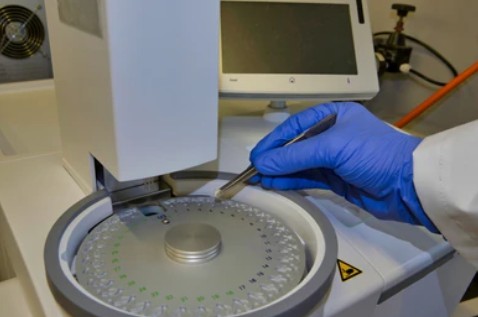X-ray diffraction (XRD) and differential scanning calorimetry (DSC) have been widely used to characterize the structure and properties of raw materials, active pharmaceutical ingredients (APIs), and excipients, thereby helping pharmaceutical companies better control the quality and stability of the product and ensuring the safety and efficacy. CD Formulation is committed to providing customers with the most professional, reliable, and efficient XRD/DSC analysis services to help them stand out in the highly competitive pharmaceutical market.
What are XRD/DSC Analysis?
X-ray diffraction (XRD) and differential scanning calorimetry (DSC) analysis are two important techniques in materials science and chemistry used to characterize the physical and chemical properties of materials. In the pharmaceutical industry, it is used to identify and determine the purity, crystalline form, structure, and stability of raw materials, APIs, excipients, and other ingredients in pharmaceutical formulations, thereby ensuring the quality and effectiveness of drugs.
- XRD analysis is a technique used to determine crystal structure. When a sample is exposed to X-rays, the X-rays are diffracted by the crystal lattice, producing a diffraction pattern that can be used to determine the arrangement of atoms within the crystal, thereby identifying the type of crystal structure present in the sample, as well as the orientation, size, and strain of the grains.
- DSC analysis is a technique used to measure the heat flux into or out of a sample as a function of temperature. This technique is used to determine the melting point, crystallization temperature, glass transition temperature and other thermal properties of a sample through controlled heating of the sample.

Explore Our XRD/DSC Analysis Services
As an expert in the development of innovative drug delivery systems and a global leader in CMC analysis, CD Formulation provides unparalleled XRD/DSC analysis services to customers around the world for drug development, helping customers determine the crystalline form, thermal properties, and stability of pharmaceuticals.
We have advanced instruments and equipment and an experienced team to provide customers with high-quality XRD/DSC analysis data and reports accurately and quickly. Whether it is screening of new drug candidate compounds or quality control of marketed drugs, we can provide customized analysis solutions to ensure the smooth progress of our customers' drug development projects.
XRD Analysis Services
Our team of XRD analysis experts assists you in characterizing drugs, excipients, and other pharmaceutical ingredients, providing information on structure, crystal form, and a range of other important structural parameters. Through our XRD analysis, we help you evaluate drug properties and address:
- Issues of pharmaceutical crystal form and purity.
- Interactions between pharmaceuticals and excipients.
- Pharmaceutical stability and solubility issues.
- Confirmation of drug structure and optimization of analytical methods.
- Preparation and quality control issues.
Our XRD Analysis is Commonly Used for:
- Analyze the crystal structure of drugs, excipients and other pharmaceutical ingredients.
- Batch-to-batch consistency testing.
- Identification of unknown compounds and counterfeit drugs.
- Characterization of nanoformulations, such as nanoparticles.
- Characterizing the stability of pharmaceutical compounds and the occurrence of hydration and dehydration processes.
- Analyze active drug-excipient compatibility to ensure consistent properties such as drug release and bioavailability.
- Provides valuable information on polymorphism, crystallinity, and amorphous characteristics of solid dosage forms.
- Identification of impurities in pharmaceuticals.
- API confirmation.
- Production quality control
Available XRD Analysis Programs:
- Samples are typically submitted in powder form and then placed on a sample stage.
- XRD pattern data is obtained by measuring the angle and intensity of X-rays reflected by the sample.
- The collected XRD data were processed through data processing software to eliminate background noise and perform data smoothing.
- Determine the crystal structure and phase information in the sample by using standard reference databases or simulated experiments for phase identification.
- Determine the crystal structure, grain size, lattice parameters, and other characteristics of the sample based on the XRD pattern data and phase analysis results.
DSC Analysis Services
Our team of DSC analysis experts assists you in characterizing the thermal properties and stability of your drug and performs data analysis and interpretation to ensure its quality meets requirements. By evaluating drug product properties through DSC analysis, we can help you:
- Drug purity: Determine the purity of the drug by detecting the melting temperature and heat enthalpy of the sample, and verify whether its ingredients meet the requirements.
- Drug stability: Evaluate the thermal stability of drugs at different temperatures to help determine whether they will degrade or deteriorate during storage and use.
- Crystallization characteristics: Detect the crystallization characteristics of drugs, such as crystal form, crystal defects, etc., to understand the solid-state properties and solubility properties of drugs.
- Solubility: Evaluate the solubility properties of drugs at different temperatures to provide a reference for the development and optimization of pharmaceutical preparations.
- Drug phase transition: Detect the phase transition behavior of drugs at different temperatures, such as melting point, glass transition, etc., to help understand the properties and characteristics of drugs.
Available DSC Analysis Programs:
- Typical analysis: involves placing a small amount of sample (1-15 mg) into a closed crucible, which is then inserted into a temperature-controlled DSC cell. Samples are heated or cooled in a controlled manner, and the heat flow is monitored and analyzed to identify phase changes and reactions.
- Advanced analysis (modulated DSC analysis): involves the use of temperature modulation techniques to pinpoint weak transitions and distinguish overlapping thermal events with higher precision and accuracy for more complex studies.
Why Choose CD Formulation for XRD/DSC Analysis?
- Flexible, tailor-made solutions to meet customers' specific needs and requirements.
- Extensive expertise and experience in performing XRD/DSC analysis ensures accurate and reliable results.
- Advanced equipment and technology for precise measurement and detailed characterization of APIs and excipients.
- Strict quality assurance protocols ensure that all analyses are performed to the highest standards and comply with industry standards.
- Fast and efficient service ensures that customers' projects can be delivered on time.
CD Formulation has extensive experience and expertise in performing XRD/DSC analysis services. Our team of experienced scientists will work with you to develop a customized testing plan that meets your specific needs. Please contact us to learn more about how we can help you conduct XRD/DSC testing and verify the safety of your products to regulatory requirements.
Please note: Our products and services are not intended to be used directly in diagnostic or therapeutic procedures.
Related Services



